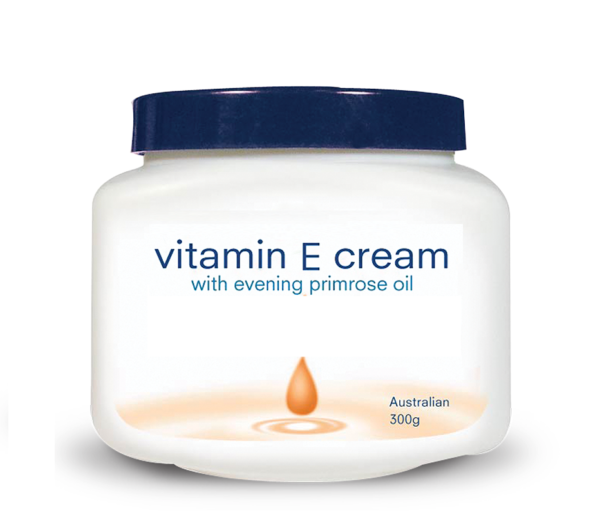Topical Vitamin E stabilizes the cell membranes. It is used for the relief of mild skin diseases such as diaper rash, burns including sunburns, and dry skin. For superficial skin conditions, it is available as vitamin E ointment, cream, and vitamin E oil. It is also included in cosmetic products such as sunscreens, eye serum, anti-aging creams, and makeup solutions. It lightens the skin and helps fade dark spots because of its cell-regenerating properties. Vitamin E oil is very thick and difficult to spread. It acts as a great moisturizer. Topical Vitamin E oil is usually obtained by puncturing the capsule and applying it over the face and stretch marks. Topical Vitamin E is best applied at bedtime over the face when used as a skin moisturizer, toner, and anti-aging treatment. Because of the viscid nature, application in the morning may make it difficult to put makeup or serum on top of it.
Topical vitamin E for hair:
- Some people mix vitamin E oil with jojoba oil and apply it on hair.
- This is done by puncturing three or four capsules and mixing the oil obtained with 2 tablespoons of jojoba oil.
- The mixture is used to massage hair and left overnight.
Who should avoid applying topical Vitamin E?
Individuals with acne or oily skin who are prone to develop ance should not use it over the face because it may clog the pores and worsen the underlying condition.
Topical Vitamin C, a water-soluble vitamin, works great in individuals with oily skin.
Topical Vitamin E Dose in Adults
Dose in the Dermatological conditions:
-
- At night, apply a light coating over the afflicted area.
Topical Vitamin E Dose in Childrens
Dose in the treatment of Superficial dermatologic irritation:
-
Infants, Children, and Adolescents:
- At night, apply a light coating over the afflicted area.
Pregnancy & Lactation:
- It is safe for use in pregnancy and breastfeeding.
Topical Vitamin E Dose in Renal Disease:
- It is safe for use in patients with kidney disease.
Topical Vitamin E Dose in Liver Disease:
- It is safe for use in patients with liver disease.
Side effects of Topical Vitamin E
- Adverse effects have not been mentioned for topical vitamin E.
- However, it may clog skin pores and worsens acne.
Contraindication to Topical Vitamin E:
- Allergic reactions to vitamin E or any component of the formulation.
Monitoring Paraeters:
None required. Monitor only for the response. If no improvement is noted, consult a healthcare provided.
How to use topical vitamin E?
- The topical vitamin E should be applied over the affected skin after cleaning the area with water and soap and washing the hands prior to its use.
- After its application, it should be rubbed well to enhance its absorption.
- It is best to use it at bedtime as applying makeup or serums over the face in the morning would be difficult since topical vit e is very viscid.
Mechanism of action of Topical Vitamin E:
- It prevents the oxidation of vitamin A and ascorbic acid (vitamin C).
- It protects the cell membranes of polyunsaturated fat acids from free radicals by acting as a free-radicals scavenger.
- It protects red blood cells against hemolysis by shielding their cell membranes from free radicals.
International Brands:
- Gordons-Vite E
- Natural Vitamin E Moisturizing
- Vitamin E Beauty
- Vitec
- Xtra-Care
- Evasen Crema
- Rosken Skin Repair Vitamin E
Topical Vitamin E Brands in Pakistan:
Topical Vitamin E oil may be obtained from Vitamin E capsules. Vitamin E capsules brands in Pakistan can be viewed here. Evion is a commonly used oral capsule containing 400 and 600 mg of vitamin E.







